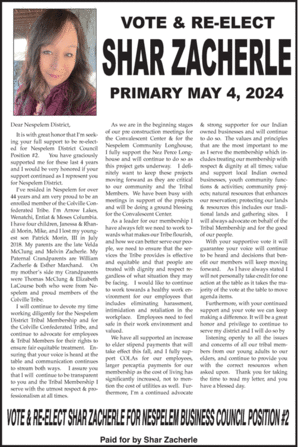Citizen protests new rules
Presents state Attorney General opinion to council
Last updated 7/11/2012 at 1:19pm
An Electric City resident told the city council at its last meeting in June that rules it had enacted for their meetings were probably illegal.
Jeff Eiffert took issue with the council’s desire to curb comments and criticism by trying to keep visitors from making complaints in public meetings.
Eiffert had fired off his objections to the state Attorney General’s Office, whose open government ombudsman, Tim Ford, said if the council has a place on the agenda for citizens to speak, it can’t tell them what they can or cannot say.
Ford’s similar response to the Palouse, Wash., council stated: “The ability of citizens to voice their opinions about performance of the public employees and officials who serve the public is one of the cornerstones of a free and accountable government. Particular criticism of government conduct may irritate the city, but such criticism is protected by the First Amendment of the United States Constitution and by the Washington Constitution.
“A municipality that deliberately allows a general public comment period during its meetings creates a limited public forum for constitutionally protected free speech. The city may not restrict speech it merely dislikes, but has some ability to limit public comment in a neutral manner. The city may set time limits or noise limits to public speech.”
Eiffert read the letter from the Attorney General’s Office to the council. At an earlier meeting, he had asked who wrote the new policy and was told the city’s attorney had.
Mayor Jerry Sands asked for a copy of Eiffert’s letter and stated that the city would send it to their attorney for advice.
The council passed a policy that created a lot of questions from members of the council and those who regularly come to council meetings to speak on issues of the day.
Eiffert and Sam Stanczak, another resident of the city, are regular attendees at the meetings and have made officials uncomfortable by the challenges the two make of the actions and proceedings of the council.
“The United States Constitution,” the letter from Ford continues, “reflects a profound national commitment to the principle that debate on public issues should be uninhibited, robust, and wide-open, and that it may well include vehement, caustic, and sometimes unpleasantly sharp attacks on government and public officials.”
Neither Eiffert nor Stanczak have raised their voices or otherwise been antagonistic in their addresses to the council.
The new policy recently adopted by the council states: “Citizen complaints brought directly to the council during a meeting will not be heard or considered.”





Reader Comments(0)